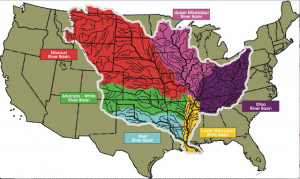I consider myself an environmentalist, and being an Environmental Studies student, the first thought that comes to mind when learning new topics is “how does it affect the environment”? This new topic is the world food system, and after having read Michael Pollan’s In Defense of Food, it seems like there is a huge effect on the environment.
There is a problem that I knew about previously, and I knew it had to do with United States agriculture, but I didn’t realize how much it didn’t make sense and how deep it is rooted in agriculture. The problem is dead zones in the Gulf of Mexico. There are hypoxic conditions in the Gulf of Mexico where animals can’t get enough oxygen to survive. Animals that can’t move, such as shellfish, experience huge die offs, and large fish can attempt escaping, but there have been huge amounts of dead fish as well. First connection to the food system; it’s severely damaging the fishery and hurting the fishing industry.

These hypoxic conditions happen when large algal blooms grow and then die. Their decomposition uses up oxygen in the water. These algal blooms are coming from excess nutrients in the water: nitrogen, potassium, and phosphorous. The excess nutrients are coming from the farmland in middle of the United States. Much of the nutrients put into the soil on farmlands is runoff into rivers that flow into the Gulf of Mexico. The nutrients are dumped into the farmland because monocropping has effectively stripped large swaths of land of natural nutrients. Joel Salatin has shown that farming with a diversity of crops revives the land of its nutrients. This would call for no, or even just less fertilizer. Less fertilizer would cut down the algal blooms and the hypoxic conditions could decrease significantly.
Citations
Pollan, Michael. In Defense of Food: An Eaters Manifesto. Penguin Books, 2009.
“Source: LUMCON.” Mother Jones, Mother Jones and the Foundation for National Progress, 14 Aug. 2013, www.motherjones.com/food/2013/08/gulf-of-mexico-dead-zone-growth/.
SaveSave

Mikaela, you bring up some good points about how fertilizer damages are fisheries. As more fertilizer runs off into the Gulf of Mexico, toxic algae blooms not only kill the fish in the Gulf but fertilizer also harms the overall biodiversity of the sea by harming coral and plankton. In order to curb algae blooms you propose that the agricultural industrial system uses less nitrogen, potassium, and phosphorus fertilizers. While I agree that using less fertilizer can be beneficial to the ecological system as a whole, using less fertilizer will result in fewer yields for farmers. If farmers produce fewer yields a restructuring of the American agricultural system will be needed. Although you are correct in pointing out that by planting a diversity of crops helps the revive the land of its nutrients, it would be interesting in seeing how the agricultural industry would adopt to these polices. Not only would fertilizer corporations push back against these changes, but seed companies like Monsanto would resist the idea of changing mono-cropping. Furthermore, farmers would need to uproot all their crops in order to plant a diversity of seeds, and would need to plant new seeds that are not dependent on fertilizers. Overall, these changes would affect the produce available in the U.S. as well as the price of food in the U.S.